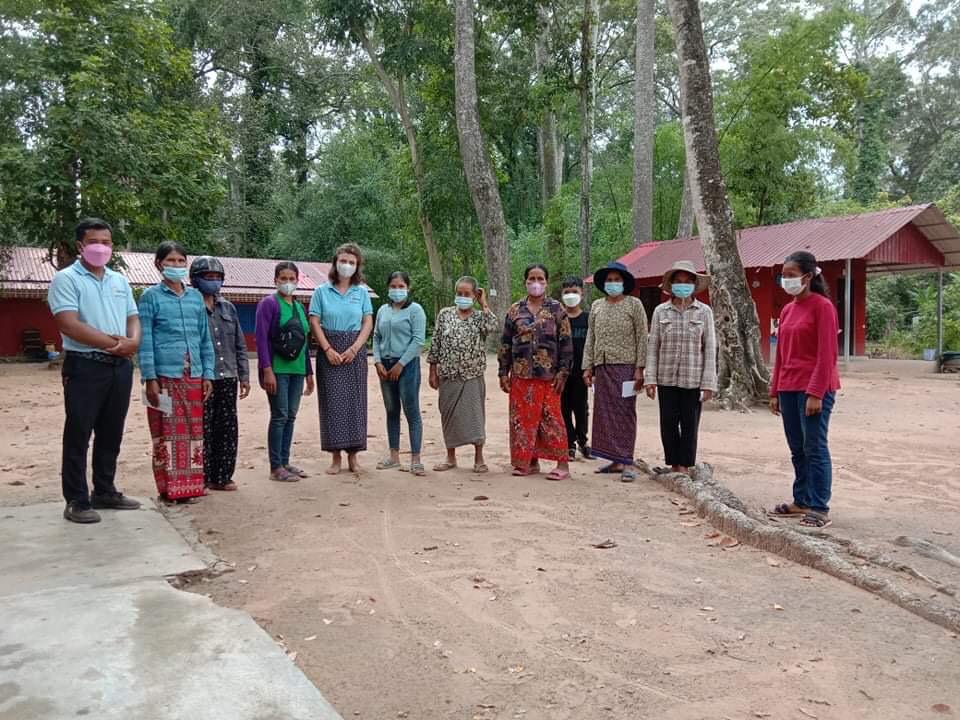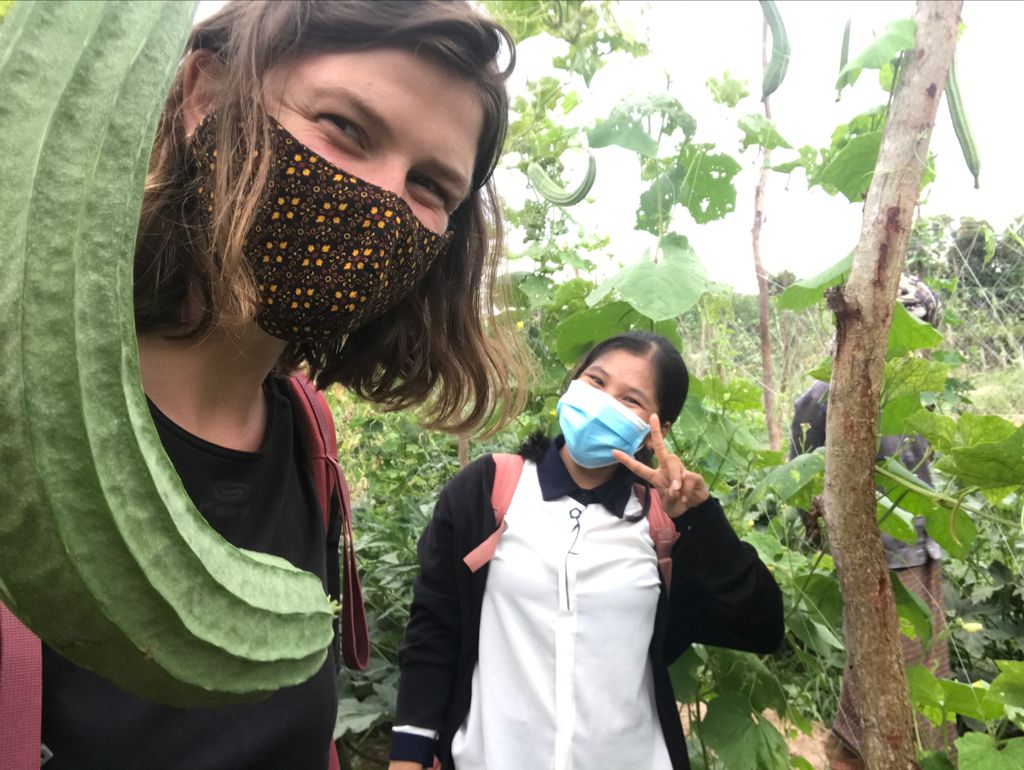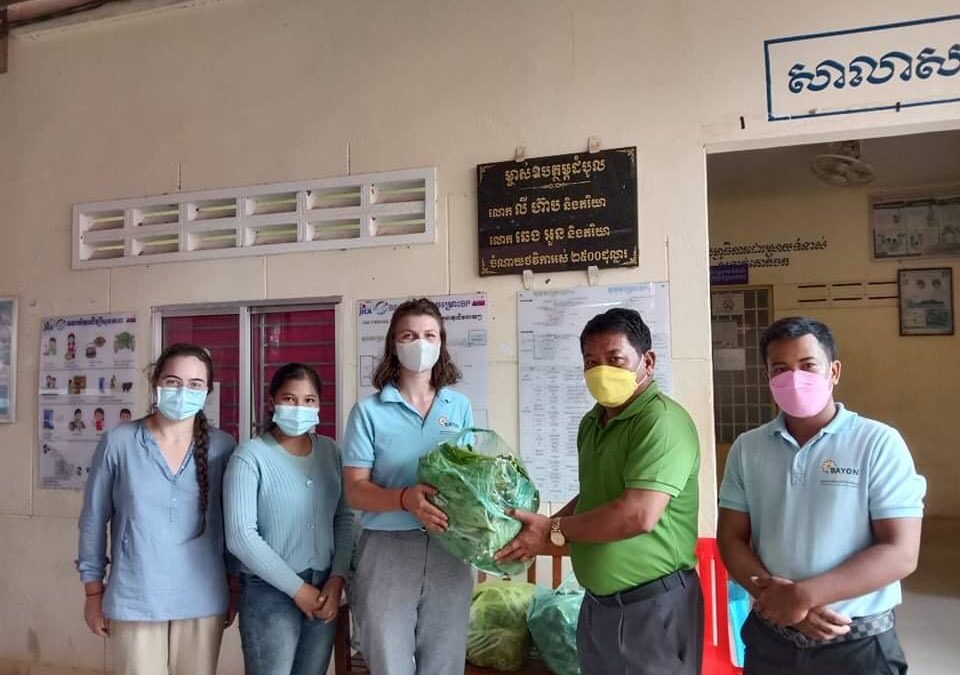Laurane was an intern at the Agroecology School from March to August 2021. Although the health situation was difficult during this period, she comes back with words on what she learned here, and the memories she takes with her to France.
What was your first step or your goal in coming here?
I arrived in Cambodia in March 2021 for a 6-month internship during my gap year from my agricultural engineering school (ENSAT Toulouse, France). My mother has been working for over 15 years in the French-Cambodian association “Pour un Sourire d’Enfant” and she visits Cambodia every year. Since I was a child, I have heard so much about this country on the other side of the world; it seemed very close to me although we do not hear much about it in the media. I am very sensitive to the social situation in Cambodia and its history; I think it is essential to give the tools to each population to succeed in moving towards sustainable, solidary and self-sufficient food production.
Coming here, I wanted to help and accompany women and families in the field so that they could become autonomous and independent, thanks to market gardening and agroecology. I am convinced that agroecology is a lever to counter climate change and social problems related to food and health, which are present all too often in developing countries.
What was your role during these 6 months?
The arrival of Covid in Cambodia made the period somewhat complicated, as the lockdowns and quarantines prevented us from visiting the farmers to ensure a regular follow-up as well as the vegetable distribution to the beneficiary families. These last 6 months have been a little unpredictable, but I was able to provide support to the Green Farming team, in particular in analysing the problems met by the farmers and the team, understanding the stakes of marketing vegetables and their production in organic farming as well as the difficulties brought about by the diseases and pests present in the vegetable gardens.
I worked together with Theary, a student from the Agroecology Bayon School and an intern with the Green Farming team. She was very inspiring, sharing her technical and theoretical knowledge directly with the farmers!
I also accompanied 3 students from the school on an internship at our partner Fair Farms in the South of Cambodia. I was able to work with them on the project of planting vegetation cover on a pepper farm. Another project was more oriented towards the protection of the environment and the reforestation of 5 degraded hectares in order to create a stable environment favorable to bees and including melliferous resources (which produce honey) all year round.

What did you learn from a professional and personal point of view?
During these 6 months, I learned a lot about tropical agriculture and the issues related to the new seasonality: the dry season and the rainy season each last 6 months, and include various challenges. During the dry season, we must successfully irrigate the crops to avoid the development of diseases, and create new shelters to protect the crops from the sun. During the rainy season, part of the fields are flooded and diseases and pests develop very quickly, so it is important to develop new techniques to preserve the crops.
The Bayon School project works hard at finding solutions to the challenges faced by the farmers, giving them tools that can be passed on to help other Bayon beneficiary families.
I also learned about the creation and management of an agroecology school in a developing country where agriculture is often synonymous with poverty and social failure. I was able to see the inside workings of an association and the drive of its members to succeed in following the children and beneficiaries of the NGO as best as possible, even in the current health context. I met many actors and pioneers of agroecology in Cambodia, all of them very inspiring.
On a personal level, I learned to speak Khmer, thanks to my colleagues, and I was able to discover their culture within the families in a more intimate and personal context than at the Bayon School.
What have you noticed about the health crisis? What can you say about the impact it has on farmers and their families?
“The February 20 Community Event” has turned the daily life of Khmers upside down. Cambodia had managed to curb and control the number of cases on its territory by sacrificing the tourism economy, closing its borders to tourist visas as early as March 2020. The Bayon families living around the temples have many jobs related to tourism and I have seen a great deal of solidarity within the families, with the return of brothers, sisters, and children who had left to work away from the temples. The farmers benefited from more labor to work with them in their gardens, but they also had more mouths to feed, representing a bigger workload. Their families became interested in the project and it was very motivating to work with them and explain the basics of agroecological principles!
What lessons can you take from this particular learning environment?
It is very important to have good communication within the teams in order to support each other and find solutions together. This is true for the Green Farming team, but also for the social team, as we work together distributing vegetables to the beneficiary families. It is in this type of crisis situation that we can observe the resilience of a project and a team, as well as improve certain points to better understand and find solutions to these difficulties.

What do you retain from this experience?
Whilst agriculture and agro-ecology act as a lever for the empowerment of a country, it is really the education of future generations that will boost the development of Cambodia. The majority of the members of the Bayon office have benefited from educational aid programs and, in turn, they are giving back to the underprivileged children of the Angkor temples. I really hope that Cambodia’s vaccination campaigns will allow the schools to reopen quickly so that the children can return to school.
I thank my colleagues Theary, Chorvin, Sreyleak, Sakoth and En for their welcome, the transmission of their knowledge and the smiles I received. I leave for France with my head full of memories of the farmers, of their laughter and of the pride they display in producing these vegetables and providing for their families. I will remember the courage and strength of these elderly women, who often work alone and who were able to regain their dignity and joy, thanks to the acquisition of this new knowledge in agriculture. The best moments of the week were always the visit of their gardens and the distribution of vegetables. It is such a pleasure to see them blossoming, exchanging tips and admiring each other’s vegetables!
I wish good luck to Marie, the new intern of the Green Farming team, who will be the lucky new interlocutor of the farmers!
If you had to summarize your experience here in 3 words?
Gratitude, Challenge and Autonomy. And Morning Glory!

